
Flagellation, flogging or whipping is the act of beating the human body with special implements such as whips, rods, switches, the cat o' nine tails, the sjambok, the knout, etc. Typically, flogging has been imposed on an unwilling subject as a punishment; however, it can also be submitted to willingly and even done by oneself in sadomasochistic or religious contexts.

Buzkashi is the national sport of Afghanistan. It is a traditional sport in which horse-mounted players attempt to place a goat carcass in a goal. Similar games are known as kokpar, kupkari, and ulak tartysh in Uzbekistan and Kazakhstan.
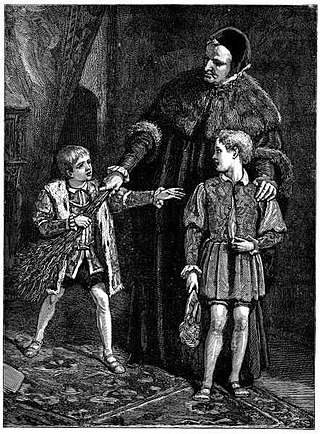
A whipping boy was a boy educated alongside a prince in early modern Europe, who supposedly received corporal punishment for the prince's transgressions in his presence. The prince was not punished himself because his royal status exceeded that of his tutor; seeing a friend punished would provide an equivalent motivation not to repeat the offence. An archaic proverb which captures a similar idea is "to beat a dog before a lion". Whipping was a common punishment administered by tutors at that time. There is little contemporary evidence for the existence of whipping boys, and evidence that some princes were indeed whipped by their tutors, although Nicholas Orme suggests that nobles might have been beaten less often than other pupils. Some historians regard whipping boys as entirely mythical; others suggest they applied only in the case of a boy king, protected by divine right, and not to mere princes.
Hugh Aston was an English composer of the early Tudor period. While little of his music survives, he is notable for his innovative keyboard and church music writing. He was also politically active, a mayor, Member of Parliament, and Alderman.
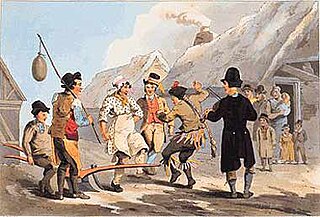
Plough Monday is the traditional start of the English agricultural year. Plough Monday is the first Monday after Epiphany, 6 January. References to Plough Monday date back to the late 15th century. The day before Plough Monday is referred to as Plough Sunday, in which a ploughshare is brought into the local Christian church with prayers for the blessing of human labour, tools, as well as the land.

John Maddison Morton was an English playwright who specialised in one-act farces. His most famous farce was Box and Cox (1847). He also wrote comic dramas, pantomimes and other theatrical pieces.
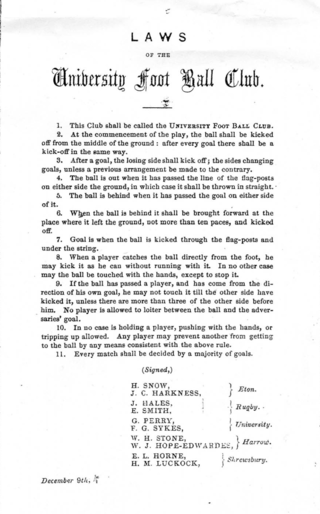
The Cambridge Rules were several formulations of the rules of football made at the University of Cambridge during the nineteenth century.
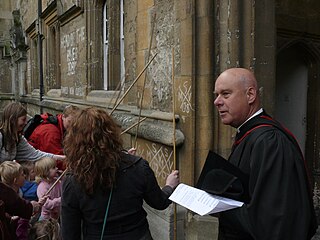
Beating the bounds or perambulating the bounds is an ancient custom still observed in parts of England, Wales, and the New England region of the United States, which involves swatting local landmarks with branches to maintain a shared mental map of parish boundaries, usually every seven years.

The Mari Lwyd is a wassailing folk custom founded in South Wales and elsewhere. The tradition entails the use of an eponymous hobby horse which is made from a horse's skull mounted on a pole and carried by an individual hidden under a sheet.
During the early modern era, pupils, former pupils and teachers at English public schools developed the rules of football, eventually leading to the first written codes of football most notably the Eton College (1815) and Aldenham school (1825) football rules, and rugby football (1845).
Whuppity Scoorie is a traditional festival dating from the early 19th century observed by people in Lanark, Scotland, on 1 March to celebrate the approach of spring. Local children gather around the local St Nicholas kirk where at 6 pm the wee bell is rung. This is the starting sign for the children to run around the church in a clockwise direction, making noise and swinging paper balls on strings above their heads as they run. It is no longer a race for safety reasons and to increase fairness for the younger participants. After three laps, they scramble for coins thrown by members of the Community Council who host the event. The Community Council also hosts a "Whuppity Scoorie Storytelling Festival" and art workshops after the event until 7 March.

The Courir de Mardi Gras is a traditional Mardi Gras event held in many Cajun and Creole communities of French Louisiana on the Tuesday before Ash Wednesday. Courir de Mardi Gras is Louisiana French for "Fat Tuesday Run". This rural Mardi Gras celebration is based on early begging rituals, similar to those still celebrated by mummers, wassailers, and celebrants of Halloween. As Mardi Gras is the celebration of the final day before Lent, celebrants drink and eat heavily, dressing in specialized costumes, ostensibly to protect their identities. In Acadiana, popular practices include wearing masks and costumes, overturning social conventions, dancing, drinking alcohol, begging, trail riding, feasting, and whipping. Mardi Gras is one of the few occasions when people are allowed to publicly wear masks in Louisiana. Dance for a Chicken: The Cajun Mardi Gras, a documentary by filmmaker Pat Mire, provides insight into the history and evolution of this cultural tradition. In popular culture, two HBO series also make reference to the tradition.

A soul cake, also known as a soulmass-cake, is a small round cake with sweet spices, which resembles a shortbread biscuit. It is traditionally made for Halloween, All Saints' Day, and All Souls' Day to commemorate the dead in many Christian traditions. The cakes, often simply referred to as souls, are given out to soulers who go from door to door during the days of Allhallowtide, singing and saying prayers "for the souls of the givers and their friends", especially the souls of deceased relatives, thought to be in the intermediate state between Earth and Heaven. In England, the practice dates to the medieval period, and it continued there until the 1930s by both Protestant and Catholic Christians. In Sheffield and Cheshire, the custom has continued into modern times. In Lancashire and in the North-east of England, soul cakes were known as Harcakes, a kind of thin parkin.

Vagrancy is the condition of wandering homelessness without regular employment or income. Vagrants usually live in poverty and support themselves by travelling while engaging in begging, scavenging, or petty theft. In Western countries, vagrancy was historically a crime punishable with forced labor, military service, imprisonment, or confinement to dedicated labor houses.
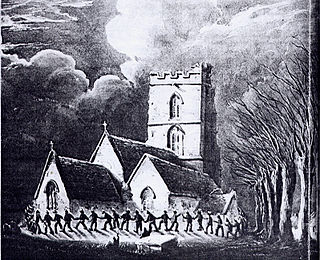
Clipping the church is an ancient custom that is traditionally held in England on Easter Monday or Shrove Tuesday or a date relevant to the Saint associated with the church. The word "clipping" is Anglo-Saxon in origin, and is derived from the word "clyppan", meaning "embrace" or "clasp". Clipping the church involves either the church congregation or local children holding hands in an inward-facing ring around the church, and can then be reversed to an outward-facing ring if a prayer for the wider world beyond the parish is said. Once the circle is completed onlookers will often cheer and sometimes hymns are sung. Often there is dancing. Following the ceremony a sermon is delivered in the church and there are sometimes refreshments. Christians adopted this tradition to show their love for their church and the surrounding people. Currently, there are only a few churches left in England that hold this ceremony, and all of these appear to honour it on a different day.

Easter traditions are customs and practices that are followed in various cultures and communities around the world to celebrate Easter, which is the central feast in Christianity, commemorating the resurrection of Jesus. The Easter season is seen as a time of celebration and feasting, in contrast to the antecedent season of Lent, which is a time of penitence and fasting.
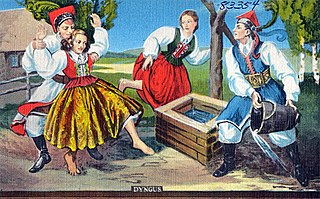
Śmigus-dyngus or lany poniedziałek is a celebration held on Easter Monday across Central Europe, and in small parts of Eastern and Southern Europe. The tradition is widely associated with Poland in English-speaking countries and is observed by Polish diaspora communities, particularly among Polish Americans who call it Dyngus Day. The tradition is also deeply rooted in Hungary.
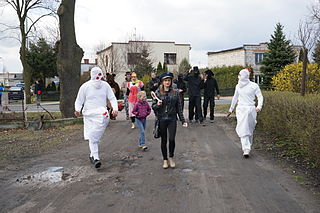
Siwki or Siwek is a regional tradition rooted in Polish folklore, in which a procession of dressed up individuals stops passers-by and performs tricks on them. The event usually takes place on Easter Sunday or Easter Monday.

Siuda Baba is an old Polish folk custom, celebrated on Easter Monday and surviving today in only a handful of villages surrounding Kraków. The character of Siuda Baba is performed by a local man who dresses up as a shabbily clothed woman whose face is blackened with soot. Siuda Baba walks from house to house, accompanied by other characters – a Gypsy and Krakowiacy. The group visits houses, collecting donations and smearing girls' faces with soot.
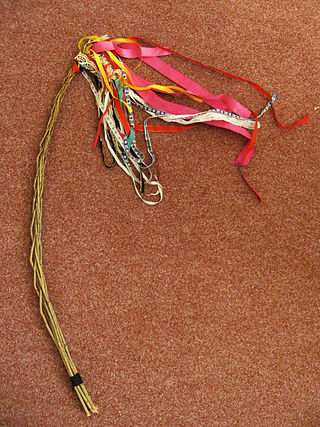
In the Czech Republic, Poland, Slovakia, and some parts of Hungary, the Easter whip is used as part of a tradition where boys are splashed with water and girls whipped with a decorated willow branch on Easter Monday.
















